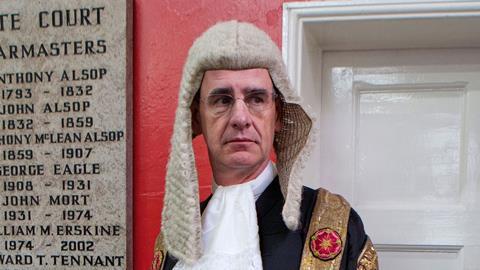The judge tasked with deciding the structure of future civil courts has dismissed accusations that they will offer a second-class service.
Lord Justice Briggs (pictured) told a Law Society conference yesterday that lawyers and judges will still have important roles in the potential three-stage online court.
Briggs’ report, due out next month, is likely to back a three-tiered approach of triage, conciliation and a final judgment for most civil cases valued up to £25,000.
’Everything that can be done, ought to be done to encourage parties thinking of litigation to get advice as early as possible on the merits of their case from a qualified lawyer. I am quite clear on that.
‘I am not looking at this as creating a lawyer-free zone, that is not any part of my conception,’ he stressed.
Briggs envisaged qualified lawyers being part of the process before the first and third stages, helping clients to decide whether to progress their case, and if conciliation has not worked, help them prepared their argument for the judge.
It is also likely that case officers, who will be the first human point of contact for litigants in the online process, will be legally qualified.
Briggs said he was aware that some vulnerable or elderly people may have difficulty in accessing the new facility, but support services will be made available, possibly staffed by law students.
‘[But] they can’t just be left to get on with it pro bono and they will need funding,’ he added.
The judge, who was tasked with a review of civil courts by the lord chief justice last summer, said solicitors will need to change the way they work, although he appreciated the number of checks required at the outset of meeting clients will cause difficulties when it comes to charging for work.
‘I do think the time has come in relation to smaller cases for ways of unbundling solicitors’ services and for the bar to be better with direct access,’ said Briggs.
‘[Lawyers] can also hone skills which would really make the difference in a trial situation for someone who might otherwise not be well represented. They will not need to write endless letters to the other side to ask about how badly they are behaving.’
The biggest task for policy-makers, he conceded, will be creating algorithms for extracting information from potential litigants at the triage stage.
Briggs has already visited the Canadian province of British Columbia, which has a fully functioning online court, although he stressed the triage stage in development in England and Wales will not extend to advising on the merits of a case, as happens across the Atlantic.
‘[The first stage] is not going to ask legal questions, it is going to ask pure factual questions and gently delve into what is the heart of your grievance,’ said Briggs.
‘It is going to need a fantastic amount of work by subject matter experts, perhaps some judges, knowledge engagement experts, language experts [and] IT experts.’
The judge revealed it is possible that the online court will have a ‘soft’ launch, featuring one particular type of claim or having a starting limit of £10,000 while the process is further tested.
Registration is now open for the Civil Litigation Section autumn conference, featuring a keynote speech from Lord Justice Briggs. Find out more and register your place here.




























24 Readers' comments